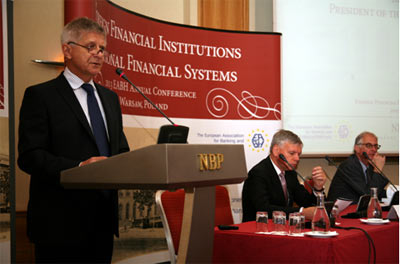
"Foreign Financial Institutions and National Financial Systems" - that was the theme of this year's 23rd EABH (European Association for Banking and Financial History) conference, organized by The Citi Handlowy Leopold Kronenberg Foundation at Citi Handlowy and the National Bank of Poland.
On June 7-8 the annual EABH conference took place in Warsaw. Already the 23rd time that the conference has been held, this year's edition focused on international financial systems and institutions. This is the second time that Poland has hosted the event, the first time being in 2000.

Marek Belka, President of National Bank of Poland
(Photo: Włodzimierz D±bkowski, National Bank of Poland)
As Krzysztof Kaczmar, President of The Citi Handlowy Leopold Kronenberg Foundation, pointed out: History is one of the sciences which, paradoxically, enables us to look into the future. Thanks to the lessons of the past, we can draw constructive conclusions that we can translate into effective action. This is particularly the case with finances.
This year's presentations dealt with topics such as the experiences of European banking in the context of development of international trade in the 19th and 20th centuries, the cross-border activities of banking institutions in the present day and historically, and the presence of foreign capital in the Polish banking system during the interwar period. One of the most interesting panel discussions was undoubtedly the one moderated by Marcin Murawski, Director of the Public Sector Department of Citi Handlowy, on "Current and Future Trends in International Banking: Did Getting Involved in Banking in Eastern Europe Pay Off?". His guests were Murat Çetinkaya (Vice-President of the Central Bank of Turkey), Andrzej Reich (Director of the Department of Banking Regulations, Payment Institutions and Credit Unions of the Polish Financial Supervision Authority), Dariusz Daniluk (President of the Management Board of BGK), and Hugo Bänziger (Chairman of the Board of Eurex). Besides presentations and panel discussions, conferences guests could take part in workshops on the role of archives, museums and academic centers in the promotion of financial education.

Round Table: Current and Future Tendencies in International Banking: Did getting Involved in Banking in Eastern Europe Pay off?
(Photo: Włodzimierz D±bkowski, National Bank of Poland)
Over 200 guests took part in the conference, including representatives of the central banks of Albania, Austria, the Czech Republic, France, Greece, Indonesia, Portugal, Romania, Russia, Slovakia, Spain, Switzerland and Turkey. In addition, there were representatives from leading academic institutions worldwide (including Harvard University, Hebrew University of Jerusalem, Princeton University, University of Pennsylvania and the University of Vienna) and European banks (including Deutsche Bank, BNP Paribas, ING and Intesa Sanpaolo).
EABH (The European Association for Banking and Financial History)
The Association was established in 1990 as a platform for dialogue and exchange among historians, archivists, economists and bankers. It supports the protection of historical documentation relating to banking and finance, provides consulting and organizes training for archivists. While it deals primarily with economic history, it does so through the prism of the present day and the current economic situation.
The membership of EABH comprises leading European financial institutions, such as: HSBC, ABN Amro, ING Group, Credit Suisse Group, Deutsche Bank and Unicredit. Poland is represented at the EABH by The Citi Handlowy Leopold Kronenberg Foundation and the National Bank of Poland.
